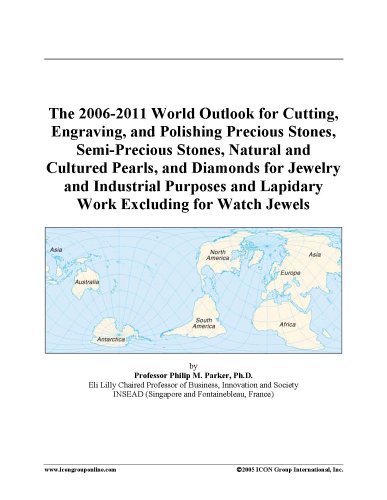The 2006-2011 World Outlook for Cutting, Engraving, and Polishing Precious Stones, Semi-Precious Stones, Natural and Cultured Pearls, and Diamonds for ... and Lapidary Work Excluding for Watch Jewels Review
The 2006-2011 World Outlook for Cutting, Engraving, and Polishing Precious Stones, Semi-Precious Stones, Natural and Cultured Pearls, and Diamonds for ... and Lapidary Work Excluding for Watch Jewels Overview
WHAT IS LATENT DEMAND AND THE P.I.E.?The concept of latent demand is rather subtle. The term latent typically refers to something that is dormant, not observable, or not yet realized. Demand is the notion of an economic quantity that a target population or market requires under different assumptions of price, quality, and distribution, among other factors. Latent demand, therefore, is commonly defined by economists as the industry earnings of a market when that market becomes accessible and attractive to serve by competing firms. It is a measure, therefore, of potential industry earnings (P.I.E.) or total revenues (not profit) if a market is served in an efficient manner. It is typically expressed as the total revenues potentially extracted by firms. The “market” is defined at a given level in the value chain. There can be latent demand at the retail level, at the wholesale level, the manufacturing level, and the raw materials level (the P.I.E. of higher levels of the value chain being always smaller than the P.I.E. of levels at lower levels of the same value chain, assuming all levels maintain minimum profitability).
The latent demand for cutting, engraving, and polishing precious stones, semi-precious stones, natural and cultured pearls, and diamonds for jewelry and industrial purposes and lapidary work excluding for watch jewels is not actual or historic sales. Nor is latent demand future sales. In fact, latent demand can be lower either lower or higher than actual sales if a market is inefficient (i.e., not representative of relatively competitive levels). Inefficiencies arise from a number of factors, including the lack of international openness, cultural barriers to consumption, regulations, and cartel-like behavior on the part of firms. In general, however, latent demand is typically larger than actual sales in a country market.
For reasons discussed later, this report does not consider the notion of “unit qua
Available at Amazon Check Price Now!
*** Product Information and Prices Stored: Jan 12, 2012 23:42:20
Help Power Washer Wands Where To Buy Frye Engineer Boot









No comments:
Post a Comment